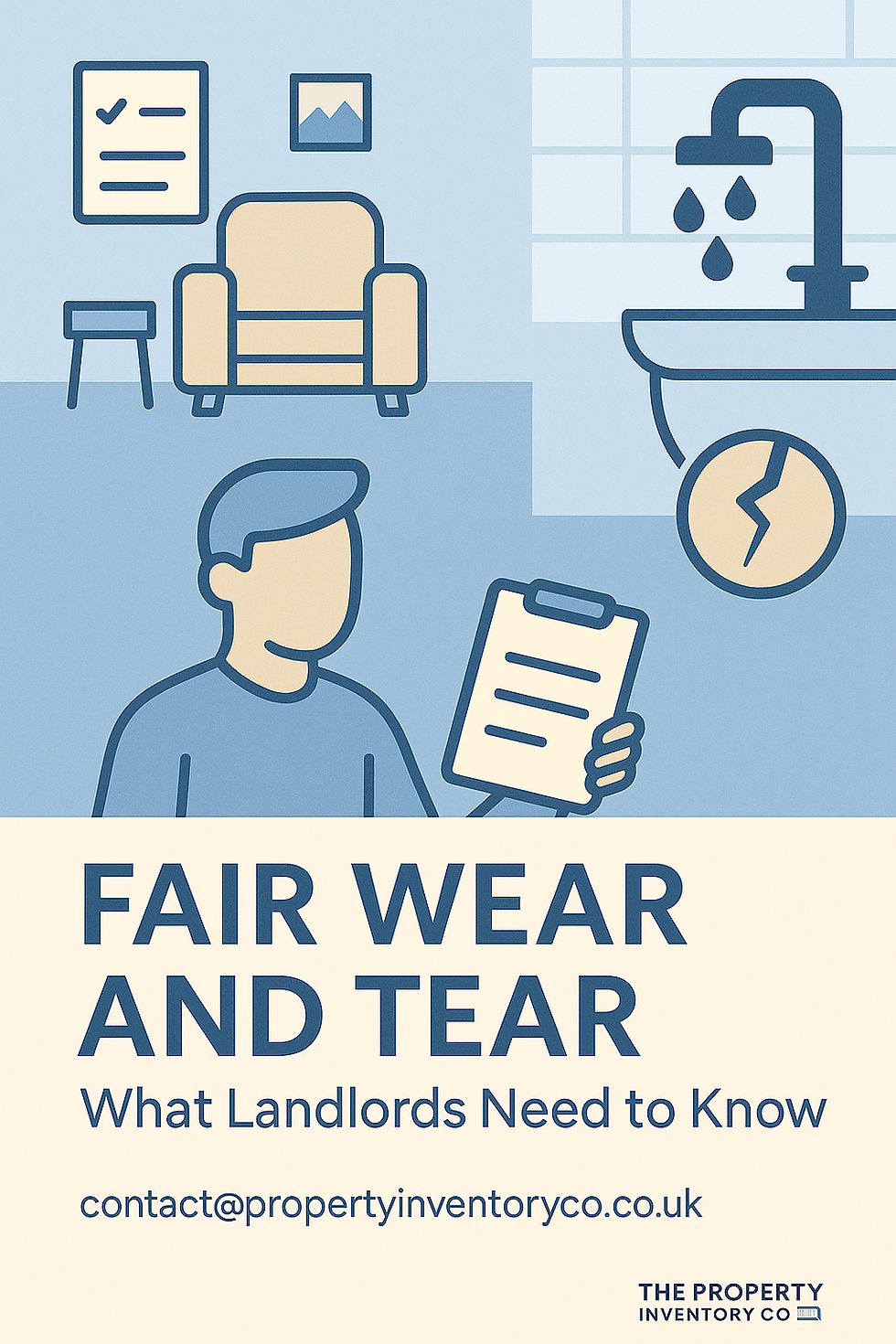Fair Wear and Tear: What Landlords Need to Know
- Property Inventory Co.

- Aug 13, 2025
- 3 min read

Understanding the Difference Between Damage and Acceptable Use
One of the most common sources of disagreement between landlords and tenants at the end of a tenancy is the concept of fair wear and tear. As a landlord, it’s vital to understand what this term really means — and how to distinguish natural use from actual damage.
In this post, we’ll explain what fair wear and tear is, why it matters, and how professional inventory reports can help you handle it correctly and fairly.
What is Fair Wear and Tear?
Fair wear and tear refers to the gradual deterioration of a property and its contents through normal, everyday use. It’s not caused by neglect, misuse, or abuse — it's simply the result of time passing and people living in a space.
For example:
Worn carpets in high-traffic areas
Faded paint due to sunlight
Minor scuff marks on walls or furniture
Loose door handles or hinges from repeated use
These are all typically considered fair wear and tear — and not something a tenant should be charged for.
What Counts as Damage?
Damage, on the other hand, is caused by carelessness, neglect, or deliberate action. These issues go beyond natural wear and may warrant deductions from the tenant’s deposit.
Examples of damage include:
Large stains or burns on carpets
Holes in walls from nails, screws, or impacts
Broken appliances due to misuse
Missing or broken furniture
Cracked tiles or smashed windows
Understanding the difference is critical for resolving disputes fairly and within the law.
Why It Matters
Landlords are legally required to return a tenant’s deposit at the end of a tenancy minus only justified deductions. Making inappropriate deductions for wear and tear can lead to:
Deposit disputes with the tenant
Rejected claims by deposit protection schemes
Damage to your reputation or agency relationships
Potential legal action if the matter escalates
Factors That Influence Fair Wear and Tear
The level of acceptable wear and tear depends on several factors:
Length of tenancy: The longer the stay, the more wear is expected.
Number of occupants: More people = more use.
Age and quality of items: A brand-new carpet will age differently from one that's already five years old.
Type of occupants: For example, student or family tenancies often come with heavier use.
This is why context matters when assessing the property post-tenancy.
How Inventory Reports Protect Everyone
Professional inventory reports act as independent evidence to distinguish between damage and wear. A comprehensive inventory includes:
Time-stamped, high-resolution photos of each room and item
Descriptions of condition and cleanliness
Notes on pre-existing marks, scuffs, or wear
Meter readings and key handover documentation
At the end of the tenancy, a check-out report compares the property's current condition with the original inventory, making it clear what’s changed — and what is simply normal use.
This gives landlords confidence in deductions and gives tenants peace of mind that they’ll be treated fairly.
The Property Inventory Company Advantage
At The Property Inventory Company, we:
Provide impartial, detailed check-in and check-out reports
Understand how to assess fair wear and tear based on professional standards
Use consistent documentation methods that stand up to scrutiny in deposit disputes
Deliver all reports digitally, with the option to print if needed
Whether you manage a single property or a portfolio across East Sussex and Kent, we help you stay compliant, professional, and protected.
Final Thoughts
Fair wear and tear is a natural part of property letting — but it shouldn’t be left to guesswork. With clear, third-party evidence from a trusted inventory provider, you can ensure a fair outcome for both landlord and tenant every time.
Ready to book your next inventory or check-out? Contact us today and take the guesswork out of managing your rental properties.
01435 508118
07428 821141




Comments